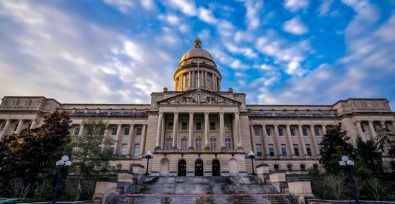A group of teens from Kentucky, U.S. has been sharing an unsettling truth in their home state: the state’s constitution still allows slavery. According to Section 25 of the Kentucky Constitution, “Slavery and involuntary servitude in this state are forbidden, except as a punishment for crime, whereof the party shall have been duly convicted.” This provision, known as the exception clause, mirrors the language of the 13th Amendment to the U.S. Constitution, which abolished slavery except as a punishment for crime.
Teens unite to right historical wrong
After a visit to Alabama in 2022, where the South Elkhorn Christian church youth group explored slavery and civil rights museums, the teens returned with a newfound awareness of Kentucky’s constitutional stance. Disturbed by the revelation, they mobilized efforts to address the issue.
Starting with their church reverend, these teens, supported by representatives from human rights commissions, ended up testifying before the legislature’s Joint Commission on Race and Access to Opportunity Committee.
Clause’s roots in discriminatory policies
Ray Sexton, executive director of the Lexington Human Rights Commission, explained to the legislature that the exception clause was originally intended for “hard labor” or “chain gangs” prevalent in late 19th-century prisons. However, it was also used to detain Black individuals post-Civil War, contributing to discriminatory laws like the Black Codes and laying the groundwork for Jim Crow laws.
Beth Musgrave shares,
David Childs, a professor of Black studies at Northern Kentucky University, said many southern states in the late 1880s and early 1900s contracted with plantations to provide labor. Those contracts provided a large source of income for southern states and led to many Black people being arrested for bogus charges and pressed into labor. Convict leasing was eventually banned. However, some companies still use prison labor but pay those inmates significantly less than non-prison employees, Childs said.
The uphill battle ahead
While acknowledging that many states allow slavery as a punishment, the advocates argue that it’s time for change in Kentucky.
Kennedy Fuqua, one of the teens, urged the legislature to fix the problem now.
“Why would anyone think that this clause is still valuable in our constitution? We believe this needs to be changed but we cannot do it alone. So we ask: Will you sit back and let this detrimental phrase create potential problems, or help us fix what’s right?”
Unfortunately, previous efforts to change the state constitution have failed. Nevertheless, the advocates are hopeful Kentucky will join Nebraska, Vermont, Utah, Colorado, Alabama, and Rhode Island in outlawing slavery and involuntary servitude.
For years, the Freedom United community has been calling for an end to forced prison labor in the U.S.
Join us today. Sign the petition and stand up for freedom.








Freedom United is interested in hearing from our community and welcomes relevant, informed comments, advice, and insights that advance the conversation around our campaigns and advocacy. We value inclusivity and respect within our community. To be approved, your comments should be civil.
The problem is not that convicts work for society, the problem is that they are forced to do so and suffer consequences if they refuse.
Hi Gary, yes, the 13th amendment of the U.S. Constitution allows slavery as punishment for a crime.
I like the idea of Road gangs,cleaning up the sides of highways.
They get exercise and fresh air and we get clean roads.
Is there a similar clause in the US Constitution to the one in the Kentucky Commonwealth Constitution?